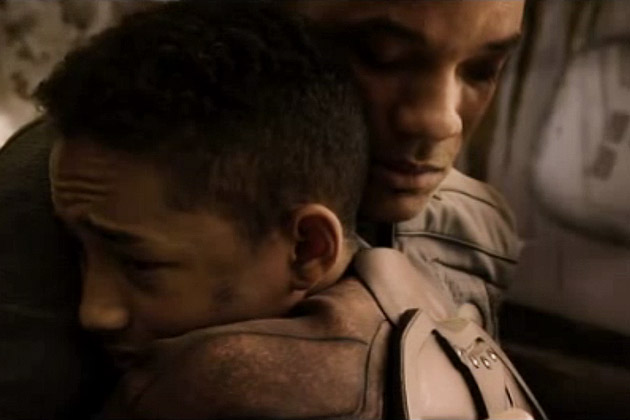By Armond White
Boys without fathers are the target audience for Will Smith’s After Earth. Its story of a boy Kitai Raige (Jaden Smith) trying to live up to his father Cypher Raige’s (Will Smith) survivalist code is a potential blockbuster, combing futuristic whimsy with street hardness (and its opposite: vulnerability). What Black moviegoer or Fresh Prince of Bel Air fan can’t imagine where this comes from or what it means?
 The theme of a youth seeking to bond with his macho military father by emulating his masculine strength is set a thousand years in the future but suggests more than the usual Summer comic -book-movie fare. If the 2010 The Karate Kid blatantly established Jaden Smith’s trust fund, this time Daddy Will produces After Earth with tough love. Not profound like Kendrick Lamarr’s deeply-felt life-lessons album Good Kid M.A.A.D City, After Earth yet evokes a similar vibe.
The theme of a youth seeking to bond with his macho military father by emulating his masculine strength is set a thousand years in the future but suggests more than the usual Summer comic -book-movie fare. If the 2010 The Karate Kid blatantly established Jaden Smith’s trust fund, this time Daddy Will produces After Earth with tough love. Not profound like Kendrick Lamarr’s deeply-felt life-lessons album Good Kid M.A.A.D City, After Earth yet evokes a similar vibe.
After Earth’s coming-of-age sci-fi story repeats the basic Luke Skywalker template with Kitai’s experiences after crash-landing on Earth and dealing with a traumatic memory. (“He’s a feeling boy” his mother says.) But whether dull or exciting, After Earth’s new genre–Hip-Hop Sci-Fi–replaces 50s Cold War metaphors and pulp video-game escapism with a morality tale about growing into manhood and responsibility. It’s exactly the unusual hybrid one might expect a thoughtful Black filmmaker to initiate.
Two images stand out: A shot of male bodies pierced by tree branches that connotes lynching and a post-apocalypse montage of urban destruction cannily resembling old news footage of riot-torn cities. Smith’s audience might not catch the significance of these images among the film’s unoriginal, Avatar-biting CGI, that’s why the story takes place after the end of history.
After Earth contemplates the future of Kitai’s perseverance. Race consciousness is implicit in the saga of both males’ survival. It transfers the stereotypical urban walkabout of drugs and gangs drama into a primal setting where Kitai tests himself against nature–the meteorological elements and the ferocity of animals (while listening to Cypher as if to an ancestral voice). From movie star father to legatee son, After Earth basically illustrates Hollywood Darwinism: what it takes to survive a vicious culture and predatory environment. (Like Tom Cruise’s inquiry into the perfidy of love in Oblivion, this personal tale of filial commitment gives us Smith’s equivalent nostalgic vision but replaces Cruise’s idealized vernal future with complicated nature.)
Sharing rage as more than a name, Cypher speaks the film’s theme: “Danger is real. Fear is a choice,” teaching his son to live as he does: “completely without fear.” Basically, it’s hip-hop braggadocio which contradicts the wiser moral lesson of the 1984 film Claudine where Diahann Carroll as a welfare mother advised her son “You’d better be scared. This world will kill you!” Only hip-hop machismo would make Smith advise “ghosting”– the film’s “neurobiological ” state where “you don’t have a trace of fear in you.” It’s a futuristic version of what Paul Laurence Dunbar described in his poem “We Wear the Mask”–at one time taught to Black school kids across the country.
As a Hollywood potentate, Will Smith wears a deliberate mask of omnipotence (his one and a half-note performance here is a bit too stoic), letting his son account for brash youth. (Shots of Jaden freezing in the cold may remind contemporary viewers of those Moorehouse College graduates getting drenched in rain while President Obama, under a canopy, lectured them not to make excuses after spending four years doing undergraduate work.)
Cypher’s unreachable paternal tenderness (from “cipher” the hip-hop term for community) may strongly affect moviegoers who welcome paternal scolding but it’s by no means sure-fire, especially given M. Night Shyamalan’s lethargic, non-visionary direction of Kitai’s sub-Apocalypto obstacle course. Smith fans who are unaware of how adolescent life lessons were taught in rich, earth-bound movies like Sounder, The Yearling, National Velvet, The Human Comedy may yet respond enthusiastically to After Earth–less as entertainment than as a matter of need.
Follow Armond White on Twitter at 3xchair
